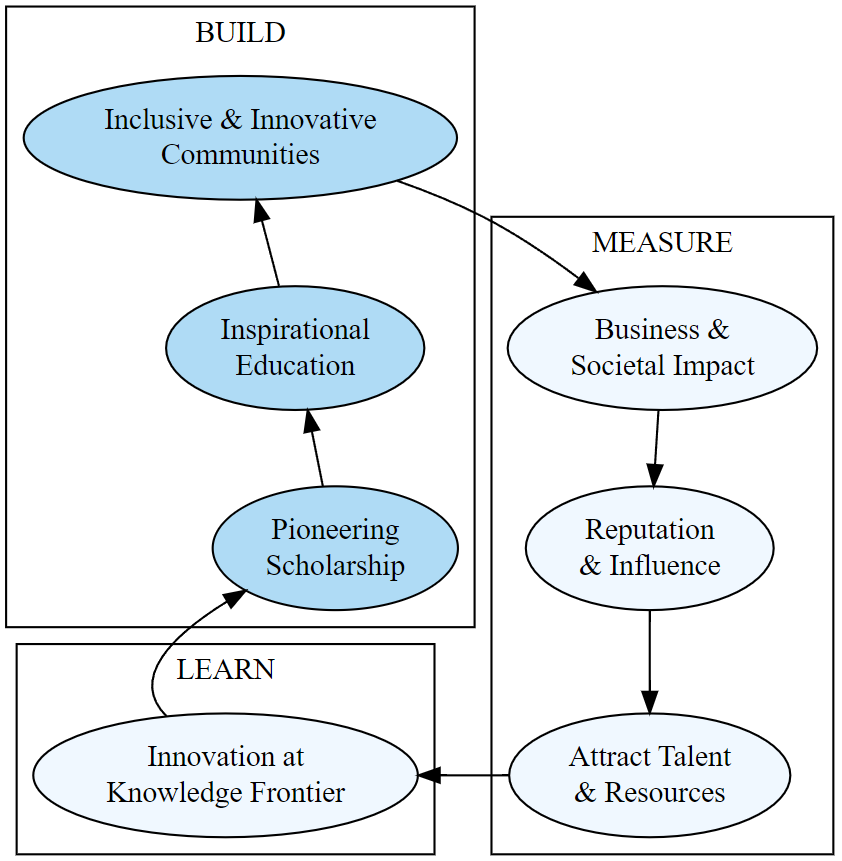
Appendix B — Example: Scoping The Lerner Undergraduate Community Flywheel
B.1 Strawman Lerner Undergraduate Community Flywheel
In this section, some ides of how to scope Lerner’s Undergraduate Community Flywheel are presented. It is by no means exhaustive, complete, or correct; presented as a strawman for illustration and starting discussion.
B.1.1 The Lerner Undergraduate Community
The is the network of people who share the common interest of educating our future business leaders and certifying those future leaders with a Bachelor’s degree. Lerner-affiliated participant involvement includes not only the students, but the professors, advisors, career services staff, executive mentors, administrative staff, etc. whose mission helps sustain and grow a flywheel that uses the underlying logic of Figure B.1. For this particular community to be defined as an LCF, we must be specific about the flywheel’s particulars.
B.1.1.1 How The UnderGraduate Community Builds Inclusive & Innovative Communities
Using the underlying logic of Figure 2.1, we start with the inclusive and innovative communities part and notice its position in the flywheel between inspirational education and business and societal impact. How does Lerner sustain and increase momentum between these two steps by facilitating inclusive and innovative communities? Here is one take on our success recipe; further aspirational details will be flushed out as part of the strategic planning process.
- UD-Powered Community: Beautiful, safe campus, easily-accessible to those in the Mid-Atlantic region. Welcoming and inclusive culture. Society-Shaping co-curriculars, clubs, and institutes.
- Industry-Engaging Sub-Communities: Student Clubs, Executive Mentors, Career Services.
- Shared Culture of Professionalism: Shared experience of BUAD110 - Basics of Business, Career Services seminars.
- Distinctive LCF’s: This strategic planning exercise will identify the Distinctive and Promising LCF’s that are mutually re-enforcing with our undergraduate community.
B.1.1.2 How The UnderGraduate Community Measures Business and Societal Impact
This is just a sample of what is typically presented. These may or may not be good metrics.
- Undergraduate Enrollment: 3,493 students.
- % of Graduating Students Rating Experience Good Or Excellent: 93%
- % of Students Offered Job Where They Interned: 52%
- % of Students With Two or More Job Offers: 52%
- % of Students Employed or Pursuing Further Education: 93%
- 2022 Average Starting Salary: $63,691
- LCF-Powered Initiatives: These important measures or signs of impact should proably be LCF-based, but mentioned here as impact we might want to have.
- Leading-Edge Symposiums
- World-shaping Publications
- Tech-enabled Productivity Innovations
- Increased Gender Equity
- Better Job Placements
- Increased Student Venture Funding
B.1.1.3 How The UnderGraduate Community Measures Reputation and Influence
This is just a sample of what is typically presented. These may or may not be good metrics.
- AACSB Accreditation Metrics: ??
- Poets & Quants – Best Undergraduate Business Schools: #60 of 94, 2022
- U.S. News & World Report – Best Undergraduate Business Programs: #86 of 516, 2023
- Related Rankings:
- #7 – Journal of Hospitality & Tourism Education ranked Lerner’s Hospitality Business Management department 7th among top U.S. institutions
- #14 – Wall Street Journal ranked public school in “Top Colleges for High-Paying Jobs in Finance.” UD’s finance graduates earn 9% above the median graduate’s average annual salary in the 10 years post-graduation.
- #16 – Wall Street Journal ranked public school in “Top Colleges for High-Paying Jobs in Accounting.” UD’s accounting graduates earn 8% above the median graduate’s average annual salary in the 10 years post-graduation.
- #38 of 50 – Top 50 Best Undergrad Programs for Entrepreneurs, Entrepreneur.com, 2023
- College Factual’s 2022 rankings for the University of Delaware include:
- #6 of 219 in Hospitality Management
- #8 of 285 in Management Information Systems
- #15 of 331 in Entrepreneurial Studies
- #21 of 895 in Marketing
- #21 of 647 in Finance & Financial Management
- #23 of 405 in International Business
- #32 of 1233 in Accounting
- #54 of 1356 in Business, Management and Marketing University of Delaware
- #38 – Kiplinger’s 100 Best Values in Public Colleges, 2019
- #38 of 227 – U.S. News Top Public Schools, 2023
- #56 of 176 – Best Colleges for Veterans, U.S. News & World Report, 2023
- New/Changing Initiatives: TBD.
B.1.1.4 How The UnderGraduate Community Measures Talent and Resource Attraction
This is just a sample of what is typically presented. These may or may not be good metrics.
- Donor Gifts: ~$7MM in 2023
- Student Recruiting Success: ??.
- Student Recruiting Success: ??.
- New/Changing Initiatives: TBD.
B.1.1.5 How The UnderGraduate Community Participates and Learns from The Knowledge Frontier
- Iterative Feedback: Foster a culture of continuous improvement by gathering feedback from researchers, students, industry partners, and other stakeholders.
- Adaptability: Learn from the outcomes of research projects, both successful and unsuccessful, to adapt and refine future initiatives.
- Pivoting: Be open to pivoting research focus areas based on emerging trends, societal needs, or changing priorities in the academic and industrial landscape.
B.1.1.6 How The UnderGraduate Community Builds Pioneering Scholarship
- Innovation and Scholarship Through Distinctive LCF’s: TBD as part of other LCF identification. Our rsearch should be tested at the frontier and constantly march towards ever-increasing business and societal impact.
- Teaching Innovation: Impressive research shaping classrooms of the future (e.g. possibly we have an LCF around assessment, notable research around spec-based grading and grading disclosure).
B.1.1.7 How The UnderGraduate Community Builds Inspirational Education
- Interdisciplinary: Double-majors, interdisciplinary majors, and plentiful minors lead to personalized education plans.
- Experiential: Breaking down the walls of the classroom to apply.
- Tech-Competency: ??
- Entrepreneurial: ??